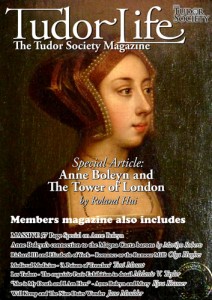 As we’re focusing on Anne Boleyn’s imprisonment and execution at the moment, I thought you’d all be interested in an article from our 57 page special on Anne Boleyn from May’s Tudor Life magazine, the monthly magazine of The Tudor Society.
As we’re focusing on Anne Boleyn’s imprisonment and execution at the moment, I thought you’d all be interested in an article from our 57 page special on Anne Boleyn from May’s Tudor Life magazine, the monthly magazine of The Tudor Society.
The article is by art historian and artist Roland Hui and is a fascinating look at Anne’s links with the Tower of London. I do hope you enjoy it. You can download a PDF of the article by clicking on either of the links below:
You can enjoy a further taster of the May magazine, which includes an article by Clare Cherry on the evidence leading to Anne Boleyn’s fall, by going to https://www.tudorsociety.com/sample-may-2015-magazine-anne-boleyn-special/.
Enjoy!